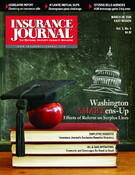The Federal Bureau of Investigation has been accumulating insurance fraud information since Hurricane Katrina and has filed charges in five cases, R. Allyson Delaney, an FBI analyst in Clarksburg, W.Va., told the National Association of Insurance Commissioners during its Antifraud Task Force meeting in Orlando, Fla., this month. The annual Spring NAIC conference featured numerous workshop groups, executive committee meetings and panels.
Agent Delaney told Robert Stanton, Antifraud Task Force chairman, the FBI is investigating several insurance-related types of fraud including: Fire claims in which homeowners did not have fire insurance; double-dipping with multiple insurance claims; property owners making claims to FEMA when they already had homeowners coverage; prior damage reported as a new claim, fraudulently creating damage claims; and stolen property. She said the FBI has recently apprehended five people on fraud charges.
Delaney said she has also received numerous reports of contractors requiring a large deposit, and then doing a bad job, or not completing the job; and property owners turning in the high bid as their claim, but paying the contractor with the lowest bid.
She said the FBI has not had many complaints about adjusters, but said common complaints have been about cases in which the adjuster gave a high estimate and then took a kickback from the contractor completing the repairs. Delaney said sometimes the recommended company did not do the work, or inflated its prices.
The working group discussed a mega-catastrophe proposal that contains strong mitigation provisions, an optional consumer purchase of an “all perils” policy and optional formation or participation by states in state or regional catastrophe funds.
Hurricane-related fraud
The Antifraud Task Force also discussed auto insurance problems in the aftermath of the 2005 hurricanes. Of major concern were issues of uniform auto titles and state-by-state codes. They cited the need for a uniform database that would allow state authorities to track vehicles damaged by floods.
The Task Force said some auto fraud cases included vehicles that were reportedly damaged by flood water, but in fact the owner had just poured tap water over the vehicle. Another involved a vehicle reportedly lost at sea that was actually sold.
Delaney said there were 32 federal agencies involved fighting fraud and ID theft. She said a major concern was over false charities that indicated they represented federal and local organizations and collected funds for hurricane victims.
Other NAIC concerns
Developing model acts to cover a wide variety of insurance issues, including confidentiality disclosures and cooperation between states, were key concerns also discussed at the recent meeting.
The Class Action Insurance Litigation Working Group, chaired by Erin Toll, discussed confidentiality concerns and whether the group should develop a model act. The working group discussed the issues and requested opinions from insurance companies represented at the meeting.
Ray Baker, Property Casualty Insurers Association of America spokesman, pointed out that with a multitude of state agencies and insurance departments, it is essential to establish a statutory doctrine and that such a document should clarify NCOIL’s position on such litigation.
Dave Snyder, American Insurance Association vice president and assistant to the general counsel, urged the working group to pay attention to “real issues” and not to just become involved in class action fights.
“This group has to focus on existing models. Don’t err in trying to go too far or recreate the system,” Snyder said. “In order to be successful this has to be a well-focused area.”
Class actions
Everyone agreed that, although the need for a Class Action Model Act might not be a major concern, it could soon become one, and therefore a recommendation to proceed with a model will be presented to the NCOIL Executive Committee.
The working group also discussed an about-to-be-released Rand Study that will discuss case scenarios for class action cases. A major concern is when a class action suit interferes with the state regulatory process.
The panel concluded that at present if a class action suit is filed, its deposition depended on the jurisdiction. In most cases, such cases would be sent to the state executive side of government and referred directly to the insurance department. In some cases, however, if a class-action suit is filed in a local court, judges feel they have to rule on its merits.
Questions were raised about what jurisdiction a particular case enters. Experts, including several members of the audience gave their opinions, concluding that it often depends on the wording in the case and whether or not the state department of insurance is named in the suit. If not, the case would probably have federal jurisdiction, but if the department of insurance is mentioned, then a state judge would decide.
The group attributed the fact that carriers are hesitant to contribute information to NAIC concerns about confidentiality. Members felt that standard confidentiality guidelines would help solve this hesitancy.
Was this article valuable?
Here are more articles you may enjoy.


 Florida Insurance Costs 14.5% Lower Than Without Reforms, Report Finds
Florida Insurance Costs 14.5% Lower Than Without Reforms, Report Finds  US Appeals Court Rejects Challenge to Trump’s Efforts to Ban DEI
US Appeals Court Rejects Challenge to Trump’s Efforts to Ban DEI  Nine-Month 2025 Results Show P/C Underwriting Gain Skyrocketed
Nine-Month 2025 Results Show P/C Underwriting Gain Skyrocketed  AIG’s Zaffino: Outcomes From AI Use Went From ‘Aspirational’ to ‘Beyond Expectations’
AIG’s Zaffino: Outcomes From AI Use Went From ‘Aspirational’ to ‘Beyond Expectations’ 


